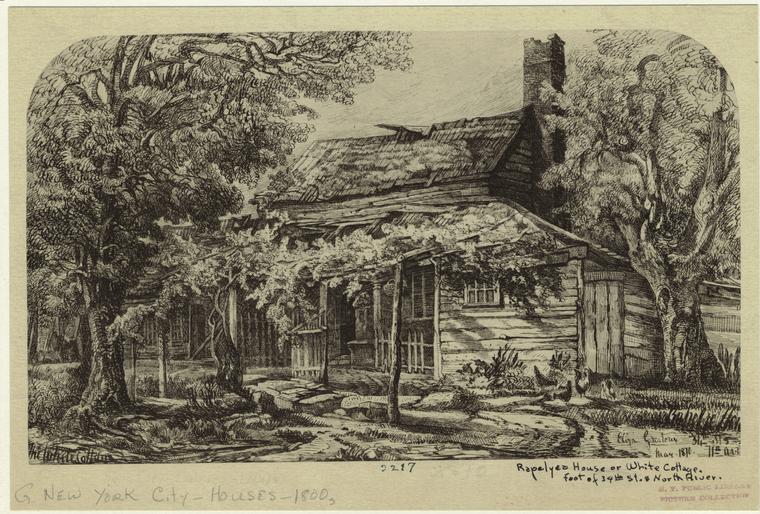
RelativeFinder.org is an amazing website for determining relationships between people. With the updated interface, you can use it to determine relationships between any two people who have records in FamilySearch.org.
Hey, Cousin!
It has been amazing to me to see how I’m related to people I would never think had any kinship to me at all. For example, the current mission president in my area comes from a Jewish family. Yet he’s my 10th cousin. His wife is also a 10th cousin, though along a different line.
One of the fun things Relative Finder does is tell you if/how you are related to various famous people. Want to know if you have actors or athletes or scientists in the family tree? Relative Finder can do that for you.
The image above is from the Rapelje home circa 1800. Joris Rapelje (19) and his bride, Catalynje Trico (18) were amongst the first settlers of New Amsterdam (now New York City). Catalynje is my 11th Great Grandmother. Her daughter (also my direct-line ancestor) was the first European child born in New Amsterdam (a settlement on the southern tip of Manhatten).
Curious whether two people you are researching might be related? Just grab the Person ID (PID) number (XXXX-XXX format) for the two folks in Family Search and go to “Connect: Connect two deceased people” or use “Relatives: Masquerade” to search out famous relatives of a deceased person.
Turns out Emma Hale [Smith] is my 4th cousin (a few times removed). Her Relief Society officers are also cousins or direct ancestors (for example, Eliza Snow is a 6th cousin).
Not everyone who has fascinated me is a cousin.
I adore Catherine Laur [Fuller Warren], but she is not my cousin. Her husband, who died at Haun’s Mill, is a cousin, however. For a moment, I thought maybe I could reserve ordinance work for her children, one of whom (John Fuller) I entered into Family Search after finding his records in 2016. Alas, someone else enjoyed the privilege of performing his proxy ordinances, less than two weeks after I added him to Family Search.
Another person I adore is Marie Boulen [du Four], an early Walloon protestant who died around 1650. I tumbled across Marie when a daughter was doing proxy baptisms a few years ago. Marie’s husband and son emigrated to New Amsterdam with the new Mme du Four after Marie’s death. Even though the island of Manhatten used to be a tiny place, which Marie’s son shared with my Walloon ancestors, I do not appear to be related to Marie Boulen.
No More Strangers
Though we might not all be traceable cousins, our congregations are filled with people who are in turn kin to much of the world. The ancestors and cousins of your friends undoubtedly include individuals from every political stripe and nation in the world. The other night I learned that a friend’s grandfather was a key adviser to General Franco of Spain.
I myself am grand-daughter of a former General who served Chiang Kai-shek. Through that lineage, I am undoubtedly related to millions of Chinese in Fujian province and Taiwan.
Our family is currently reading the portion of Alma that talks of the missionary labors of Ammon and Aaron. They chose to minister to a nation with whom their ancestors had been at war for centuries, even though lore told them the two nations arose from a common parentage. This willingness to sacrifice on behalf of former enemies is a tale we don’t see in the Bible, other than in the sacrifice of Christ himself. And Christ himself never directly ministered to those outside the family of Israel. The closest the Bible comes to the inclusive love of Ammon and Aaron is the story of how Jonah, under duress, was eventually willing to preach to the people of Nineveh.
The entire Book of Mormon is a love letter from a doomed people to us, people to whom they were not known kin. Throughout the Book of Mormon, we learn of God’s desire to unite us all with our best hope of heaven, God’s commitment to the covenant He made with us from before the foundation of the world.
I encourage you to reach out to learn more about your relatives, the struggles they endured, the cultures they embraced, and the good they did. In today’s polarized world, we can find unity and perspective through understanding our relatives in the complex human past. We can push past labels and xenophobia to find commonality and shared history.